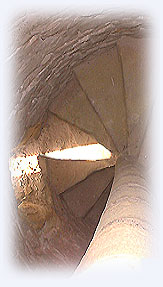The Impact of Violence on Learning
Silence
Violence can silence us. We may want to disappear and become invisible, hoping to stay safe if no one can see us. We may be too afraid or ashamed to tell anyone what is, or was, happening to us. We may become too shy or afraid to ask or answer questions, especially if the teacher reminds us of those who have hurt or abused us. We may find it impossible to participate in class. We may have trouble putting our words on paper as well as speaking out. If we are afraid to be seen or heard, it can make it very hard to actively engage with learning.
 Pictures Pictures
Silence can feel like this...
digital images by: Judy Murphy, Debbie Lifshen, and Jenny Horsman
top of page
 Quotes Quotes
Elizabeth's Story
At school, I asserted "control" over my world by not speaking. My goal was to draw as little attention to myself as possible, thus reducing the possibility of being hurt. Unfortunately, my silence attracted the attention of other children. Often, I was surrounded in the school yard and subjected to the attention I did not want. I remember quite clearly an incident in grade eight; I was completely surrounded by several classmates. As they closed in on me, I panicked and delivered a swift kick to one of my abusers. Was I angry at them? No! I was angry at myself for losing control! I reported the incident to the school principal and was ignored. The message I got was that I deserved it, that I needed to change. I didn't go to my grade eight graduation.
- - - - - - - - - - - - -
SILENCE
I became withdrawn, alone, and afraid. My parents reacted to this change with anger. They said I wasn't appreciative of what I had. They tried to figure out what was wrong, but I didn't feel they were really reaching out to me. I remained silent.
I began to find it hard to concentrate on my school work. Because of the feeling of isolation, I stopped participating in the classroom. I was afraid to ask for help when I needed it and I began to fall behind the rest of the class. I had lost my faith and the ability to trust adults. I even became embarrassed if I couldn't read new words because I felt that it was part of the punishment for being a bad person. What was happening to me must be my fault.
I was becoming very disturbed about the whole thing. I couldn't talk to my friends, my parents, my siblings, or my teachers. The teacher didn't know what was happening. My parents knew something was wrong, but didn't know how to deal with it. They simply got upset. I never got the hugs and kisses that I desperately needed. I didn't feel my parents were approachable. I felt insecure, isolated, and very alone even when I was with my family. My parents never talked about sex and I was too young to be able to bring it up with them. I'm not sure if they had the necessary knowledge about sex to talk to any of us. It added to the fear because I didn't understand what was happening to me. Because of this, the abuse kept on.
- - - - - - - - - - - - -
Students Reflect on “Flying Below the Radar” ( - 29k) - 29k)
Women in a research study wrote about all the ways they tried to avoid being noticed at school and at home. Some hoped someone would see that something was wrong, others believed it was safer to stay invisible.
top of page
Breaking the Silence
Extract from Anne-Louise Brookes book Feminist Pedagogy: An Autobiographical Approach. (Nova Scotia: Fernwood Publishing. 1992) Drawn from her doctoral thesis.
“I began writing the stories which you are about to read in the spring of 1987 while I was a student in the department of sociology at the Ontario Institute for Studies in Education. My intent was to use these stories as the data for my doctoral dissertation. I decided to write about my experiences of abuse because I wanted to understand how my learning and knowing was a shaped by that abuse. I was motivated by a desire to know how I had learned not to know something as significant as my own experiences of abuse.
I did not begin my doctoral program knowing that I would write a PhD thesis about my experiences of abuse. Rather, my intent was to study the experiences of battered women. During the years I was collecting data about battered women, I did not realize the contradiction in expecting them to share their stories with me while I remained silent about my own abuse. I did not perceive my silence as a contradiction, in part because I had buried my memories of abuse. At a more insidious level, I had learned to believe that my experiences were not important. What had happened to me, I thought, had absolutely nothing to do with my social history. For example, prior to writing my thesis I was unable to connect my fears of intimacy, writing, teaching, and speaking publicly to my experiences of abuse. I would learn through writing my thesis that I was unable to make this connection because I had not been taught to critique the world as it appeared to me. Instead, years of un-critical, rote learning had taught me how to not know.”
(Brookes, p. 2)
Read more... ( - 662k) - 662k)
top of page
|




